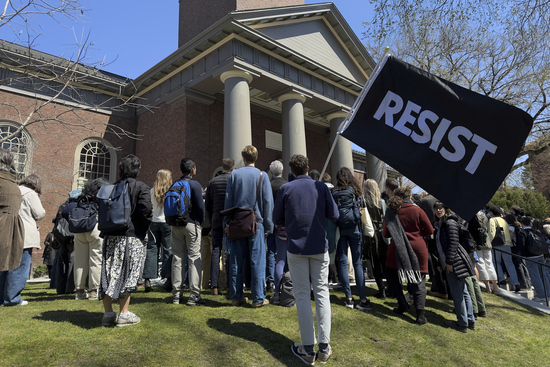Trump holds federal funding hostage as war on Harvard escalates
President Donald Trump’s administration is ratcheting up its war with Harvard University, announcing Monday that the college will be cut off from federal funding until it caves to the president’s demands.
In a letter to Harvard, later posted online, Education Secretary Linda McMahon accused the university of making a “mockery” of higher education and told it to stop applying for federal grants—“since none will be provided.”
“Harvard will cease to be a publicly funded institution, and can instead operate as a privately funded institution, drawing on its colossal endowment, and raising money from its large base of wealthy alumni. You have an approximately $53 Billion head start,” McMahon wrote, in a post riddled with grammatical errors and the usual Trump-era use of random all caps for emphasis.
The three-page letter trotted out a familiar list of conservative grievances: claims of racism, plagiarism scandals, and attacks on university leadership. At one point, McMahon asked, “Where do many of these ‘students’ come from, who are they, how do they get into Harvard, or even into our country—and why is there so much HATE?”
She also accused the university of failing “its legal obligations, its ethical and fiduciary duties, its transparency responsibilities, and any semblance of academic rigor.”
Related | Harvard risks billions as university stands up to Trump
The letter is the Trump administration’s most aggressive move yet since Harvard sued the government over its decision to freeze billions in research funding after the school refused to comply with demands for intrusive federal oversight.
Education officials had previously framed the fight as being about antisemitism on campus. But the administration’s demands went far beyond that: appointing an outside overseer to monitor “viewpoint diversity,” banning masks, eliminating diversity programs, and requiring ideological vetting for international students. Harvard’s president warned in April that what the White House was asking for amounted to government control over the university’s “intellectual conditions.”

In a statement Monday night, a Harvard spokesperson said the administration was “doubling down on demands that would impose unprecedented and improper control over Harvard University and would have chilling implications for higher education.”
“Harvard will continue to comply with the law, promote and encourage respect for viewpoint diversity, and combat antisemitism in our community,” it continued. “Harvard will also continue to defend against illegal government overreach aimed at stifling research and innovation that make Americans safer and more secure.”
The pushback comes just days after Trump threatened to revoke Harvard’s tax-exempt status. Now, he’s going after its funding. The message is clear: Universities that don’t fall in line will get punished.
And even capitulation might not be enough. Columbia University learned that the hard way. After complying with the White House’s demands in hopes of regaining access to $400 million in federal grants, the money still hasn’t materialized.
Harvard isn’t alone. Since returning to the White House, Trump has led an aggressive campaign against the country’s elite universities, which he and his allies have long accused of pushing liberal ideology and marginalizing conservatives. Beyond Harvard, the administration has threatened to pull funding from other universities and opened investigations into scores of other schools, mostly elite institutions, as part of a broader purge of diversity, equity, and inclusion programs.
But no university is more squarely in the administration’s crosshairs than Harvard.
And the fallout from this latest escalation could be massive. According to The New York Times, federally sponsored research made up 11% of Harvard’s revenue in fiscal year 2024. If that funding freeze sticks, the financial damage could be severe—and the political message even clearer.
